Satipaṭṭhāna Bhāvanānisaṁso:
The Results of the Establishing of Mindfulness
Yo hi koci bhikkhave ime cattāro satipaṭṭhāne / evaṁ bhāveyya satta vassāni,/ tassa dvinnaṁ phalānaṁ aññataraṁ phalaṁ pāṭikaṅkhaṁ / diṭṭheva dhamme aññā, sati vā upādisese anāgāmitā./
“Monks, if anyone should develop these four establishments of mindfulness • in such a way for seven years, • one of two fruits could be expected for him: • either final liberation, Nibbāna; • or if there are any fetters remaining, non-returning.
Tiṭṭhantu bhikkhave satta vassāni,/ yo hi koci bhikkhave ime cattāro satipaṭṭhāne/ evaṁ bhāveyya cha vassāni,/ tassa dvinnaṁ phalānaṁ aññataraṁ phalaṁ pāṭikaṅkhaṁ,/ diṭṭheva dhamme aññā, sati vā upādisese anāgāmitā./
“Let alone seven years, monks. If monks, anyone should develop these four establishments of mindfulness • in such a way for six years, • one of two fruits could be expected for him: • either final liberation; Nibbāna, • or if there are any fetters remaining, non-returning.
Tiṭṭhantu bhikkhave cha vassāni,/ yo hi koci bhikkhave ime cattāro satipaṭṭhāne/ evaṁ bhāveyya pañca vassāni,/ tassa dvinnaṁ phalānaṁ aññataraṁ phalaṁ pāṭikaṅkhaṁ,/ diṭṭheva dhamme aññā, sati vā upādisese anāgāmitā./
“Let alone six years, monks. If monks, anyone should develop these four establishments of mindfulness • in such a way for five years, • one of two fruits could be expected for him: • either final liberation; Nibbāna, • or if there are any fetters remaining, non-returning.
Tiṭṭhantu bhikkhave pañca vassāni,/ yo hi koci bhikkhave ime cattāro satipaṭṭhāne/ evaṁ bhāveyya cattāri vassāni,/ tassa dvinnaṁ phalānaṁ aññataraṁ phalaṁ pāṭikaṅkhaṁ,/ diṭṭheva dhamme aññā, sati vā upādisese anāgāmitā./
“Let alone five years, monks. If monks, anyone should develop these four establishments of mindfulness • in such a way for four years, • one of two fruits could be expected for him: • either final liberation; Nibbāna, • or if there are any fetters remaining, non-returning.
Tiṭṭhantu bhikkhave cattāri vassāni,/ yo hi koci bhikkhave ime cattāro satipaṭṭhāne/ evaṁ bhāveyya tīṇi vassāni,/ tassa dvinnaṁ phalānaṁ aññataraṁ phalaṁ pāṭikaṅkhaṁ,/ diṭṭheva dhamme aññā, sati vā upādisese anāgāmitā./
“Let alone four years, monks. If monks, anyone should develop these four establishments of mindfulness • in such a way for three years, • one of two fruits could be expected for him: • either final liberation; Nibbāna, • or if there are any fetters remaining, non-returning.
Tiṭṭhantu bhikkhave tīṇī vassāni,/ yo hi koci bhikkhave ime cattāro satipaṭṭhāne/ evaṁ bhāveyya dve vassāni,/ tassa dvinnaṁ phalānaṁ aññataraṁ phalaṁ pāṭikaṅkhaṁ,/ diṭṭheva dhamme aññā, sati vā upādisese anāgāmitā./
“Let alone three years, monks. If monks, anyone should develop these four establishments of mindfulness • in such a way for two years, • one of two fruits could be expected for him: • either final liberation; Nibbāna, • or if there are any fetters remaining, non-returning.
Tiṭṭhantu bhikkhave dve vassāni,/ yo hi koci bhikkhave ime cattāro satipaṭṭhāne/ evaṁ bhāveyya ekaṁ vassaṁ,/ tassa dvinnaṁ phalānaṁ aññataraṁ phalaṁ pāṭikaṅkhaṁ,/ diṭṭheva dhamme aññā, sati vā upādisese anāgāmitā./
“Let alone two years, monks. If monks, anyone should develop these four establishments of mindfulness • in such a way for one year, • one of two fruits could be expected for him: • either final liberation; Nibbāna, • or if there are any fetters remaining, non-returning.
Tiṭṭhatu bhikkhave ekaṁ vassaṁ./ Yo hi koci bhikkhave ime cattāro satipaṭṭhāne/ evaṁ bhāveyya satta māsāni,/ tassa dvinnaṁ phalānaṁ aññataraṁ phalaṁ pāṭikaṅkhaṁ,/ diṭṭheva dhamme aññā, sati vā upādisese anāgāmitā./
“Let alone one year, monks. If monks, anyone should develop these four establishments of mindfulness • in such a way for seven months, • one of two fruits could be expected for him: • either final liberation; Nibbāna, • or if there are any fetters remaining, non-returning.
Tiṭṭhantu bhikkhave satta māsāni,/ yo hi koci bhikkhave ime cattāro satipaṭṭhāne/ evaṁ bhāveyya cha māsāni./ Tassa dvinnaṁ phalānaṁ aññataraṁ phalaṁ pāṭikaṅkhaṁ,/ diṭṭheva dhamme aññā, sati vā upādisese anāgāmitā./
“Let alone seven months, monks. If monks, anyone should develop these four establishments of mindfulness • in such a way for six months, • one of two fruits could be expected for him: • either final liberation; Nibbāna, • or if there are any fetters remaining, non-returning.
Tiṭṭhantu bhikkhave cha māsāni,/ yo hi koci bhikkhave ime cattāro satipaṭṭhāne/ evaṁ bhāveyya pañca māsāni./ Tassa dvinnaṁ phalānaṁ aññataraṁ phalaṁ pāṭikaṅkhaṁ,/ diṭṭheva dhamme aññā, sati vā upādisese anāgāmitā./
“Let alone six months, monks. If monks, anyone should develop these four establishments of mindfulness • in such a way for five months, • one of two fruits could be expected for him: • either final liberation; Nibbāna, • or if there are any fetters remaining, non-returning.
Tiṭṭhantu bhikkhave pañca māsāni,/ yo hi koci bhikkhave ime cattāro satipaṭṭhāne/ evaṁ bhāveyya cattāri māsāni./ Tassa dvinnaṁ phalānaṁ aññataraṁ phalaṁ pāṭikaṅkhaṁ,/ diṭṭheva dhamme aññā, sati vā upādisese anāgāmitā./
“Let alone five months, monks. If monks, anyone should develop these four establishments of mindfulness • in such a way for four months, • one of two fruits could be expected for him: • either final liberation; Nibbāna, • or if there are any fetters remaining, non-returning.
Tiṭṭhantu bhikkhave cattāri māsāni,/ yo hi koci bhikkhave ime cattāro satipaṭṭhāne / evaṁ bhāveyya tīṇi māsāni./ Tassa dvinnaṁ phalānaṁ aññataraṁ phalaṁ pāṭikaṅkhaṁ,/ diṭṭheva dhamme aññā, sati vā upādisese anāgāmitā./
“Let alone four months, monks. If monks, anyone should develop these four establishments of mindfulness • in such a way for three months, • one of two fruits could be expected for him: • either final liberation; Nibbāna, • or if there are any fetters remaining, non-returning.
Tiṭṭhantu bhikkhave tīṇi māsāni,/ yo hi koci bhikkhave ime cattāro satipaṭṭhāne/ evaṁ bhāveyya dve māsāni./ Tassa dvinnaṁ phalānaṁ aññataraṁ phalaṁ pāṭikaṅkhaṁ, /diṭṭheva dhamme aññā, sati vā upādisese anāgāmitā./
“Let alone three months, monks. If monks, anyone should develop these four establishments of mindfulness • in such a way for two months, • one of two fruits could be expected for him: • either final liberation; Nibbāna, • or if there are any fetters remaining, non-returning.
Tiṭṭhantu bhikkhave dve māsāni,/ yo hi koci bhikkhave ime cattāro satipaṭṭhāne/ evaṁ bhāveyya māso / tassa dvinnaṁ phalānaṁ aññataraṁ phalaṁ pāṭikaṅkhaṁ,/ diṭṭheva dhamme aññā, sati vā upādisese anāgāmitā./
“Let alone two months, monks. If monks, anyone should develop these four establishments of mindfulness • in such a way for one month, • one of two fruits could be expected for him: • either final liberation, Nibbāna; • or if there are any fetters remaining, non-returning.
Tiṭṭhatu bhikkhave māso,/ yo hi koci bhikkhave ime cattāro satipaṭṭhāne / evaṁ bhāveyya aḍḍhamāso,/ tassa dvinnaṁ phalānaṁ aññataraṁ phalaṁ pāṭikaṅkhaṁ,/ diṭṭheva dhamme aññā, sati vā upādisese anāgāmitā./
“Let alone one month, monks. If monks, anyone should develop these four establishments of mindfulness • in such a way for half a month, • one of two fruits could be expected for him: • either final liberation; Nibbāna, • or if there are any fetters remaining, non-returning.
Tiṭṭhatu bhikkhave aḍḍhamāso,/ yo hi koci bhikkhave ime cattāro satipaṭṭhāne/ evaṁ bhāveyya sattāhaṁ,/ tassa dvinnaṁ phalānaṁ aññataraṁ phalaṁ pāṭikaṅkhaṁ,/ diṭṭheva dhamme aññā, sati vā upādisese anāgāmitā’ti./
“Let alone half a month, monks. If monks, anyone should develop these four establishments of mindfulness • in such a way for seven days, • one of two fruits could be expected for him: • either final liberation; Nibbāna, • or if there are any fetters remaining, non-returning.
Ekāyano ayaṁ bhikkhave maggo / sattānaṁ visuddhiyā / soka pariddavānaṁ samatikkamāya / dukkha domanassānaṁ atthaṅgamāya / ñāyassa adhigamāya / nibbānassa sacchikiriyāya;/ yadidaṁ, cattāro satipaṭṭhānā’ti,/ iti yantaṁ vuttaṁ idametaṁ paṭicca vuttanti./
“So when it was said, • “Monks, this is the one and only path • for the purification of beings, • for the overcoming of sorrow and lamentation, • for the disappearance of pain and grief, • for the attainment of the higher knowledge, • and for the realization of Nibbāna,’ • it was with reference to the Four Establishments of Mindfulness.”
Idamavoca bhagavā,/ attamanā te bhikkhu bhagavato bhāsitaṁ abhinandunti./
That is what the Blessed One said. The monks were elated and delighted in the Blessed One’s words.
Mahā Satipatthāna Suttaṁ Nitthitaṁ
(The Discourse on the Establishment of Mindfulness is finished)
Etena saccavajjena sotthi te hotu sabbada !
By this truth may all the fortune come your way !
Etena saccavajjena sabbarogo vinassatu !
By this truth may all illnesses be cured !
Etena saccavajjena hotu te jayamangalaṁ !
By this truth may you enjoy welbeing !
- Uddeso: Introduction
- 1. Kāyānupassanā: The Observation of Body
- 1.1 Ānāpāna Pabbaṁ: Section on Breathing
- 1.2. Iriyāpatha Pabbaṁ: Section on Postures
- 1.3 Sampajañña Pabbaṁ: Section on Clear Comprehension
- 1.4 Paṭikūlamanasikāra Pabbaṁ: Section on Repulsiveness
- 1.5 Dhātumanasikāra Pabbaṁ: Reflections on the Elements
- 1.6 Navasīvathika Pabbaṁ: Nine Charnel-Ground Contemplations
- 2. Vedanānupassanā: Contemplation of Feeling
- 3. Cittānupassanā: Contemplation of Mind
- 4. Dhammānupassanā: Contemplation of Phenomena
- 4.1 Nīvaraṇa Pabbaṁ: Section on the Hindrances
- 4.2 Khandha Pabbaṁ: Section on the Aggregates
- 4.3 Āyatana Pabbaṁ: Section on the Sense Bases
- 4.4 Bojjhanga Pabbaṁ: Section on the Factors of Enlightenment
- 4.5 Sacca Pabbaṁ: Section on the Four Noble Truths
- Satipaṭṭhāna Bhāvanānisaṁso: The Results of the Establishing of Mindfulness


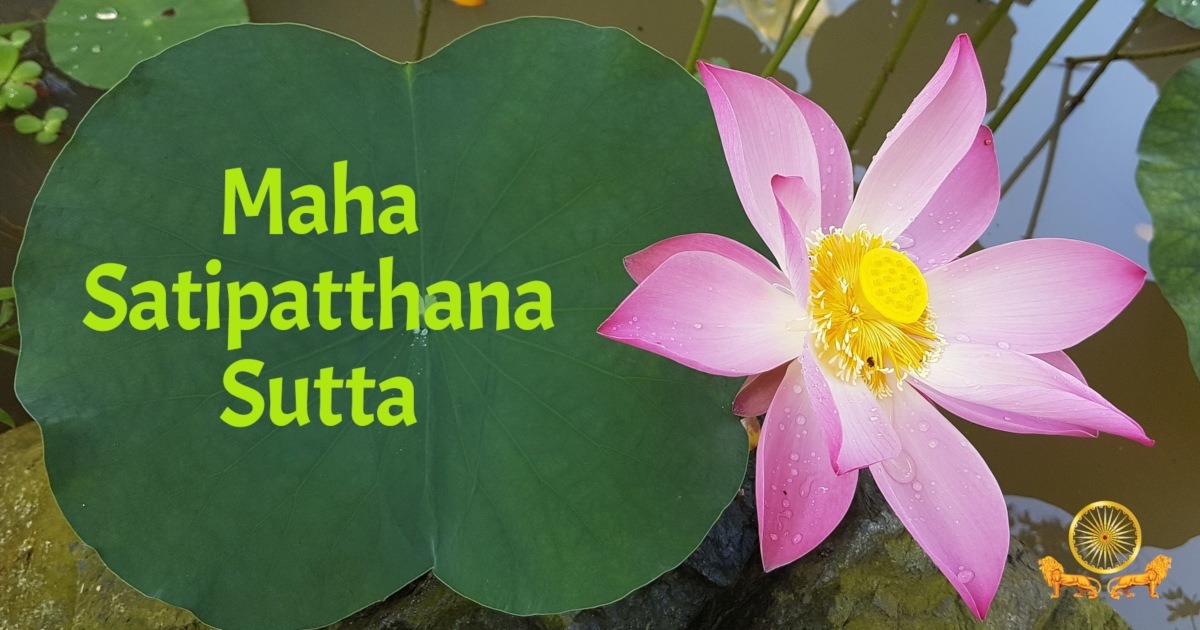


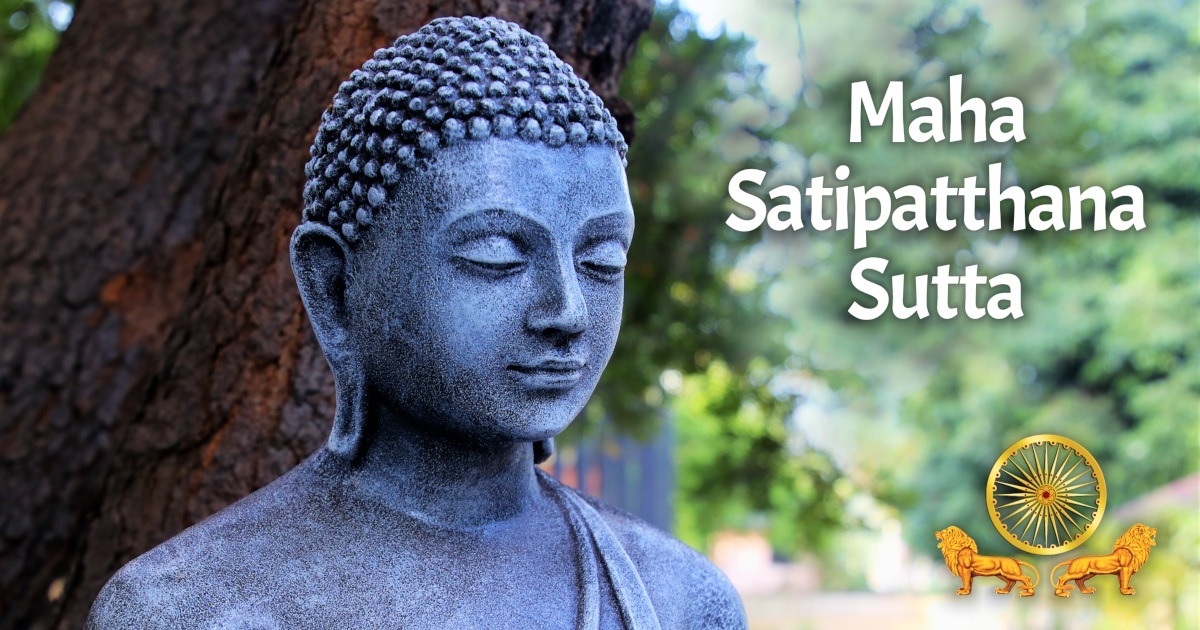
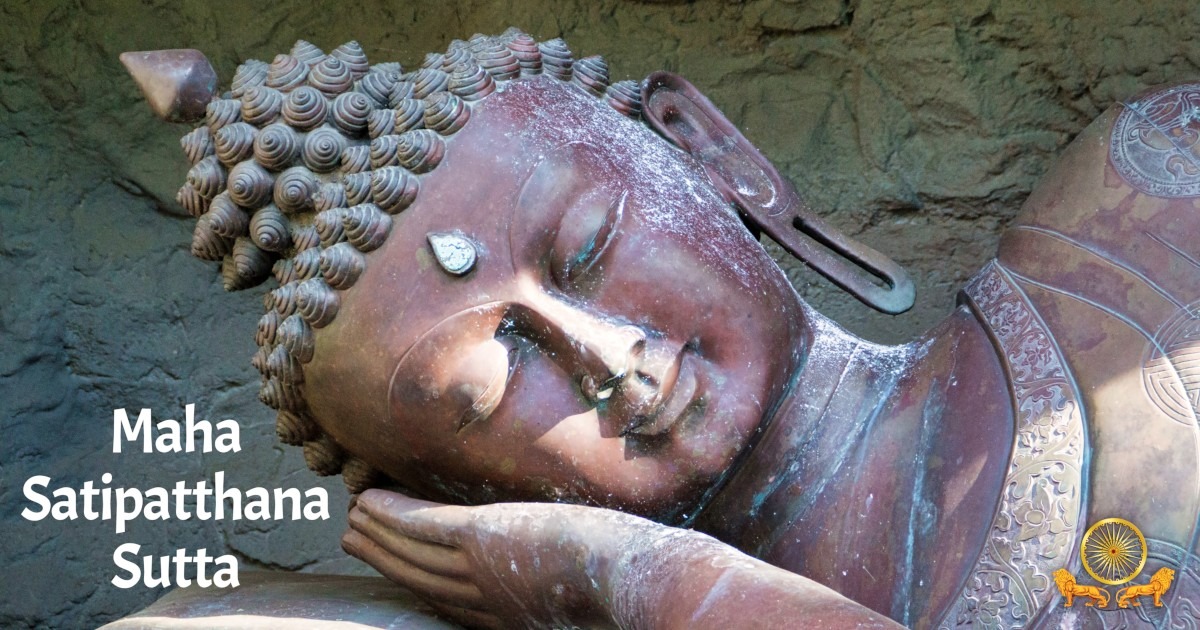

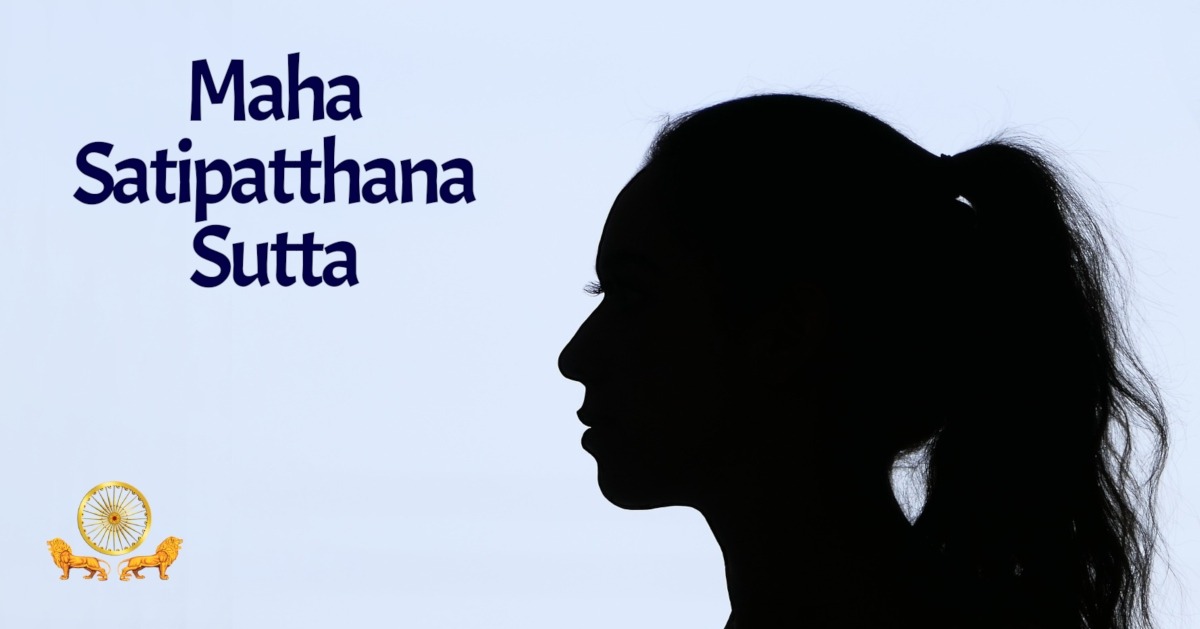



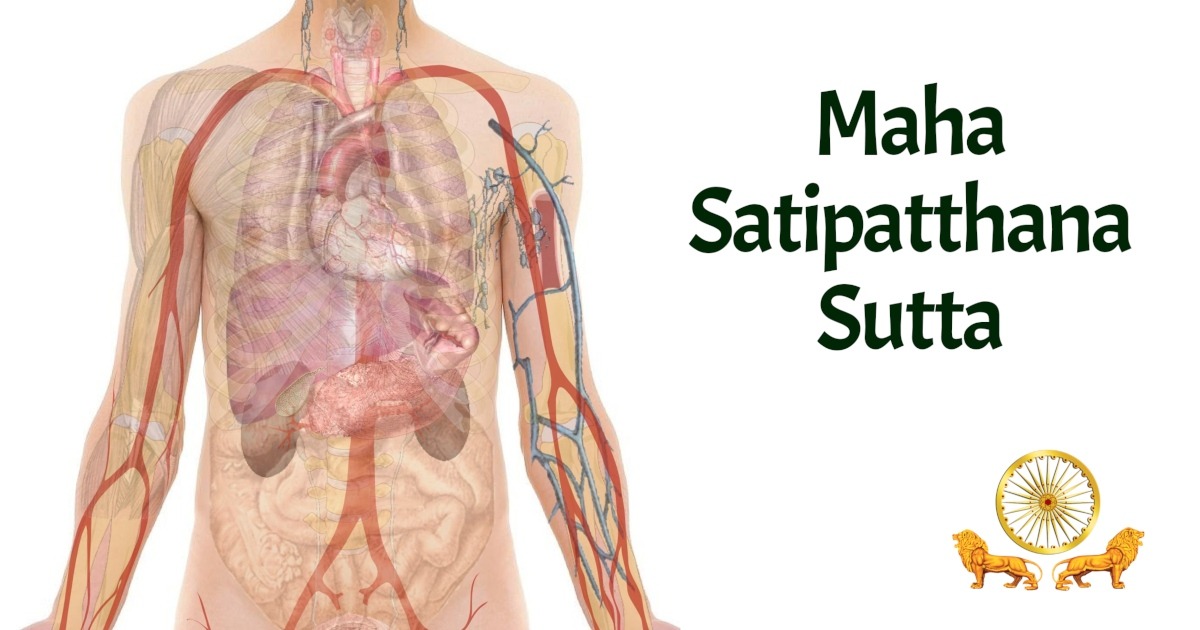







Leave A Comment